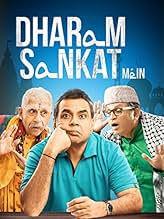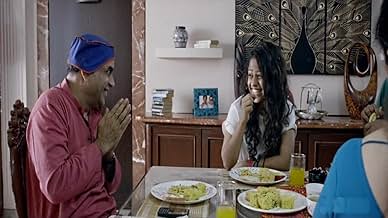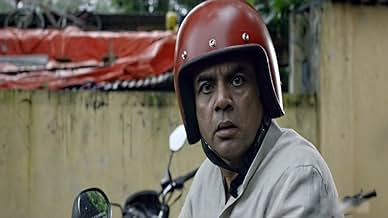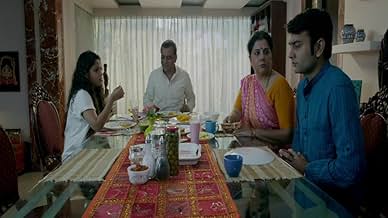CALIFICACIÓN DE IMDb
6.3/10
2.5 k
TU CALIFICACIÓN
Agrega una trama en tu idiomaAt the age of 55, a Hindu man discovers that he was born Muslim and adopted by a Hindu family.At the age of 55, a Hindu man discovers that he was born Muslim and adopted by a Hindu family.At the age of 55, a Hindu man discovers that he was born Muslim and adopted by a Hindu family.
- Premios
- 1 nominación en total
Argumento
¿Sabías que…?
- TriviaIn the beginning sequence, Paresh Rawal puts a music CD in his CD player. In that shot, you can see a cover of a DVD. that DVD is of "OMG! Oh My God". OMG is another movie starring Paresh Rawal and follows the same theme of religious differences.
- Errores[Around 0:10:57] When Dharampal is speaking over his mobile phone, the entire row of people sitting on his right side bends forward to look at him. In the next continuous shot, all the people are suddenly sitting straight up.
- ConexionesReferences OMG: Oh My God! (2012)
Opinión destacada
Hindi film industry is known to follow the running trend blindly, so here is another of those noble attempts in the newly found genre of 'religious-political satire' rediscovered post the big success of OH MY GOD! and PK. The word 'rediscovered' is being used here as the genre was always there in our cinema with films such as DHARAMPUTRA(1961), YAHI HAI ZINDAGI (1977) and more but rarely used till it was re-presented in an entertaining as well as enlightening form again in the recent years.
Coming to the latest release DHARAM SANKAT MEIN focusing on an important and burning debate that whether religion depends upon the birth or the family bringing up the child since his early childhood, the film is no doubt a brave and thought provoking attempt by its debutant director Fuwad Khan in all respects. But if only he could have stayed with the basic subject without going into the already exhausted plot of fake babas and their influence on innocent people, the film could have been another eye-opener for all those fanatic practitioners of various religions unarguably.
Revolving around a middle aged Hindu person who shockingly finds out that he was actually an adopted boy and a born Muslim, the film is an official remake of British comedy THE INFIDEL (2010) wherein the Muslim protagonist happened to be a born Jew. Now though the idea seems to be quite fresh and novel in the first look, it interestingly remains an innovative extension of many lost and found formula Hindi films only, wherein the heroes after getting lost in the childhood, get adopted and then brought up by different families practicing distinctive religions like in Manmohan Desai's AMAR AKBAR ANTHONY.
Putting it more specifically, it can also be said that DHARAM SANKAT MEIN in fact begins from where films like DHARAMPUTRA (1961) end when the lead character gets to know his real identity and religion belonging to a different family. But then the major difference here lies in the treatment which in the present times tends to become all comical instead of getting serious or deeply introspective. DHARAM SANKAT MEIN begins superbly with a scene straight away mixing Hindu, Muslim and Punjabi communities together in just 2 minutes and then its truly a treat to watch the exceptional actors Paresh Rawal and Anu Kapoor together on the screen for its next hour. The director along with his dialogue writer and actors very bravely and carefully executes many sensitive scenes related to the different traditions or religious prayers and for that they certainly need to be praised whole heartedly. For instance, as Anu asks Paresh to come into the car, Paresh questions "Kyon Musalmaan Hun Isliye?" To which Anu replies, "Nahin Tum Pareshaan Ho Isliye....."
In short it's a completely enjoyable film till the intermission with an interesting story progression and many socially relevant scenes. But as always the same cannot be said for its second half since the team is not able to maintain the quality of content and pace moving into all weird and avoidable directions in its concluding hour. Post intermission, focusing more on the fake baba (poorly played by Naseeruddin Shah) and forcibly added social-political games once again leading to a court room, the film falls apart badly and offers nothing new to the audience strongly reminding them of both OH MY GOD as well as PK in exact terms. Though few well written scenes do keep coming in at gaps in its final hour, but overall DSM completely turns into a lousy sequel of the two films mentioned above towards the end and the viewer doesn't leave the theater thoroughly impressed or entertained ruining the fine buildup made by its initial hour. Particularly when a (sanskrit) song erupts all of sudden sung by Naseer and later an utterly silly connection revealed between a Punjabi pop singer (Gippy Grewal) and the fake Baba (Naseeruddin Shah), also making a clear indication towards another Punjabi music industry icon who was allegedly caught for "Kabootarbaazi" (illegal immigration) a few years back.
In the technical department, DSM has a decent soundtrack with two catchy Punjabi based songs and one well written-composed track, "Main Kis Mitti Ka Jaaya Ve" inserted perfectly where required. Both the background score and cinematography help the film a lot to get into that pensive mood, editing makes it move at a good pace only to get disturbed by an amateurish climax, whereas the dialogue writers keep coming up with great one liners constantly till the end.
In the performances, Paresh Rawal seems to have achieved mastery in such similar roles and thus he is right there at the top with a flawless portrayal. But the one who leaves you asking for more is Anu Kapoor, once again reminding the industry about his unexplored talent not given enough chances to deliver many possible path breaking performances. Their scenes together simply become the backbone of the film along with praiseworthy supporting acts coming from Murli Sharma, Alka Kaushal and more. However the major spoilsport among these all remains the hamming act of Naseeruddin Shah, probably due to an over the top performance demanded by the director. In fact had his character not been given so much footage in the second half, the film could have reached much higher status in terms of satire as well as the message stored for the society.
Overall, DHARAM SANKAT MEIN can be seen once for its subject and all 'Anu-Paresh' sequences alone, crediting the makers for their courage shown in taking up a satirical comedy project based on such a sensitive subject in the present scenario involving 'The Original Religion'.
Coming to the latest release DHARAM SANKAT MEIN focusing on an important and burning debate that whether religion depends upon the birth or the family bringing up the child since his early childhood, the film is no doubt a brave and thought provoking attempt by its debutant director Fuwad Khan in all respects. But if only he could have stayed with the basic subject without going into the already exhausted plot of fake babas and their influence on innocent people, the film could have been another eye-opener for all those fanatic practitioners of various religions unarguably.
Revolving around a middle aged Hindu person who shockingly finds out that he was actually an adopted boy and a born Muslim, the film is an official remake of British comedy THE INFIDEL (2010) wherein the Muslim protagonist happened to be a born Jew. Now though the idea seems to be quite fresh and novel in the first look, it interestingly remains an innovative extension of many lost and found formula Hindi films only, wherein the heroes after getting lost in the childhood, get adopted and then brought up by different families practicing distinctive religions like in Manmohan Desai's AMAR AKBAR ANTHONY.
Putting it more specifically, it can also be said that DHARAM SANKAT MEIN in fact begins from where films like DHARAMPUTRA (1961) end when the lead character gets to know his real identity and religion belonging to a different family. But then the major difference here lies in the treatment which in the present times tends to become all comical instead of getting serious or deeply introspective. DHARAM SANKAT MEIN begins superbly with a scene straight away mixing Hindu, Muslim and Punjabi communities together in just 2 minutes and then its truly a treat to watch the exceptional actors Paresh Rawal and Anu Kapoor together on the screen for its next hour. The director along with his dialogue writer and actors very bravely and carefully executes many sensitive scenes related to the different traditions or religious prayers and for that they certainly need to be praised whole heartedly. For instance, as Anu asks Paresh to come into the car, Paresh questions "Kyon Musalmaan Hun Isliye?" To which Anu replies, "Nahin Tum Pareshaan Ho Isliye....."
In short it's a completely enjoyable film till the intermission with an interesting story progression and many socially relevant scenes. But as always the same cannot be said for its second half since the team is not able to maintain the quality of content and pace moving into all weird and avoidable directions in its concluding hour. Post intermission, focusing more on the fake baba (poorly played by Naseeruddin Shah) and forcibly added social-political games once again leading to a court room, the film falls apart badly and offers nothing new to the audience strongly reminding them of both OH MY GOD as well as PK in exact terms. Though few well written scenes do keep coming in at gaps in its final hour, but overall DSM completely turns into a lousy sequel of the two films mentioned above towards the end and the viewer doesn't leave the theater thoroughly impressed or entertained ruining the fine buildup made by its initial hour. Particularly when a (sanskrit) song erupts all of sudden sung by Naseer and later an utterly silly connection revealed between a Punjabi pop singer (Gippy Grewal) and the fake Baba (Naseeruddin Shah), also making a clear indication towards another Punjabi music industry icon who was allegedly caught for "Kabootarbaazi" (illegal immigration) a few years back.
In the technical department, DSM has a decent soundtrack with two catchy Punjabi based songs and one well written-composed track, "Main Kis Mitti Ka Jaaya Ve" inserted perfectly where required. Both the background score and cinematography help the film a lot to get into that pensive mood, editing makes it move at a good pace only to get disturbed by an amateurish climax, whereas the dialogue writers keep coming up with great one liners constantly till the end.
In the performances, Paresh Rawal seems to have achieved mastery in such similar roles and thus he is right there at the top with a flawless portrayal. But the one who leaves you asking for more is Anu Kapoor, once again reminding the industry about his unexplored talent not given enough chances to deliver many possible path breaking performances. Their scenes together simply become the backbone of the film along with praiseworthy supporting acts coming from Murli Sharma, Alka Kaushal and more. However the major spoilsport among these all remains the hamming act of Naseeruddin Shah, probably due to an over the top performance demanded by the director. In fact had his character not been given so much footage in the second half, the film could have reached much higher status in terms of satire as well as the message stored for the society.
Overall, DHARAM SANKAT MEIN can be seen once for its subject and all 'Anu-Paresh' sequences alone, crediting the makers for their courage shown in taking up a satirical comedy project based on such a sensitive subject in the present scenario involving 'The Original Religion'.
- bobbysing
- 31 jul 2016
- Enlace permanente
Selecciones populares
Inicia sesión para calificar y agrega a la lista de videos para obtener recomendaciones personalizadas
- How long is Dharam Sankat Mein?Con tecnología de Alexa
Detalles
- Tiempo de ejecución2 horas 9 minutos
- Color
Contribuir a esta página
Sugiere una edición o agrega el contenido que falta

Principales brechas de datos
By what name was Dharam Sankat Mein (2015) officially released in Canada in English?
Responda
















